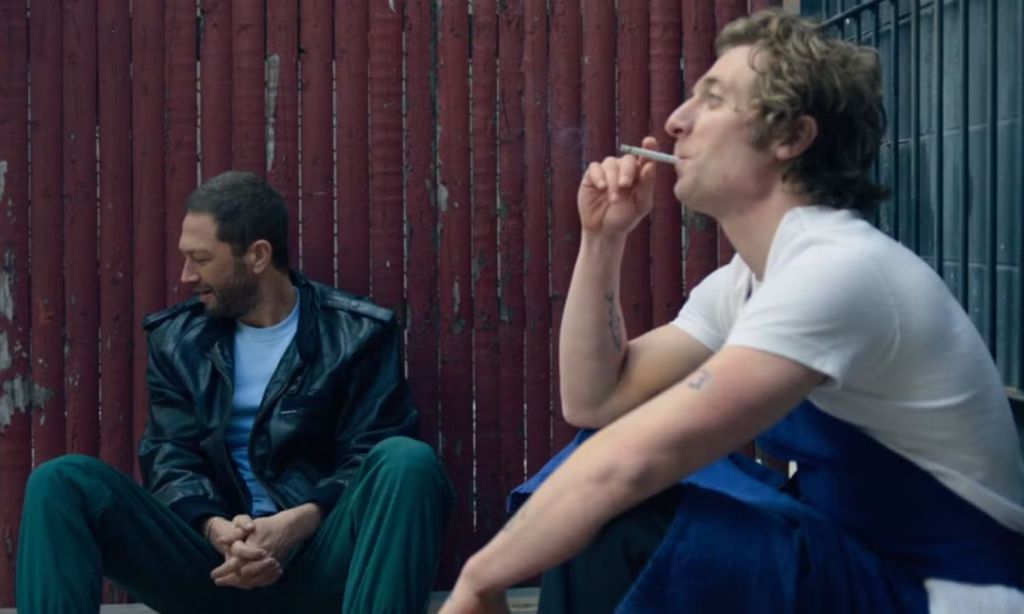There’s a scene in Nobody Wants This when Noah (Adam Brody) confirms to Joanne (Kristen Bell) that he is, in fact, the party’s resident Rabbi. His words are staggered between plumes of cigarette smoke, as a visibly bewitched Joanne holds her gaze.
Smoking, in other words, appears to be back, at least in popular culture. Some notable fixtures of the genre include Jacob Elordi’s Felix in Saltburn, Jeremy Allen-White’s Carmy in The Bear, and Phoebe Waller-Bridge’s Fleabag in… Fleabag. This is to say nothing of those viral photos of Natalie Portman having an IRL yarn with Paul Mescal, to which one X user remarked: “This picture just undid 35 years of anti-smoking ads for me.”
It’s an unexpected return for the habit that looked to be obsolete just a few years ago. Of course, there was a time when the cigarette conjured up notions of luxury and grandeur: it was during Hollywood’s Golden Age that Tobacco empires offered movie studios tons of cash to have their products appear on screen, even recruiting stars like Bing Crosby to shill their products in print.
This picture just undid 35 years of anti-smoking ads for me. https://t.co/TPBIj6JUwn
— Richy Craven (@RichyCraven) May 31, 2024
It was only in 1998 that paying for the placement of tobacco products in movies by major US tobacco companies was banned. This was followed by a surge in anti-smoking campaigning that emphasised its devastating health effects. At that point, smoking started being seen as a character flaw, burdening any remaining smokers with regret and shame. With the advent of indoor smoking bans in bars and clubs in the 2000s, even more folks resolved to quit.
Then came the 2010s, when we saw an explosion of wellness trends in culture in the form of green juice, athleisure and the enduring horror of Gwyneth Paltrow’s Goop. This all meant that smoking became even more frowned upon, albeit with vapes coming into vogue towards the end of the decade.
We saw some vaping on screen, too: from Kate Winslet’s detective in The Mare Of Eastland to Annie Murphy’s Joan on Black Mirror, it felt like the world had moved on from cigarettes, with vapes marking the dawn of an electronically-inflected future.
But the backlash to vapes came quickly. We started hearing that vaping had health consequences of its own, and the practice itself got a reputation for being kind of cringe. Meanwhile, those who had vaped in the past were much more likely than non-vapers to pick up a cigarette, and pick up a cigarette they did. Combined with feelings of boredom and hopelessness brought on by the pandemic, then, smoking returned in a way that had been inconceivable in the past.
View this post on Instagram
If you’re not convinced, then look no further than @ciginfluencers, described in its bio as “hot people and keeping the art of smoking & being cool & alive.” The Instagram account doesn’t just feature bona-fide cool girls like Ayo Edebiri being papped cigarettes in hand, we’re also treated to a still of Ken Leung sucking on a cig in Industry and the guys from Challengers puffing away on deck chairs.
The fact these commercial grabs are scattered among papped photos of celebrities is no mistake: popular culture and celebrity can’t be wholly differentiated from one another. As in the past, one always bleeds into the other.
In many ways, the revival of smoking makes sense. Because of the way trend cycles go, we find ourselves, in 2024, deep in the fallout of what The Cut called The Vibe Shift — the return of a kind of “early-aughts indie sleaze” — what with its imperfect hair and post-pandemic admission that despite our best efforts, we can’t control everything. A freak virus can upend the world as we know it and put our best-laid plans into the shitter, and no amount of girlbossing or keto dieting is going to change that.
Am I suggesting that smoking is back because we’ve realised that nothing matters and we’re all going to die? Kind of. There’s so much about this current moment that feels like a backlash to the wellness messaging of the 2010s. So much about that time was about making ourselves into perfectly self-regulating machines that a return to something as pointless and harmful as smoking was a foregone conclusion.
Last year, the New York Times reported that Hestia, a cigarette brand, was going viral thanks to vaunted cigfluencer Meg Superstar Princess endorsing the brand in her Substack newsletter. Substack, by the way, was anointed one of the features of The Vibe Shift; a move away from Silicon Valley’s fantasy of the perfectly optimised and efficient worker and a turning towards more individuality and flair.
Oh, and did you hear? Goop is going bust. All the girlbossing and self-monitoring of the 2010s has revealed itself as a fallacy and a blip. So here we find ourselves, ciggy in hand, on the other side at last.
Related: The ‘It Ends With Us’ Debate: Do Trigger Warnings Need a Spoiler Warning?
Related: Is TV Romanticising Emotionally Immature Men?
Read more stories from The Latch and subscribe to our email newsletter.







